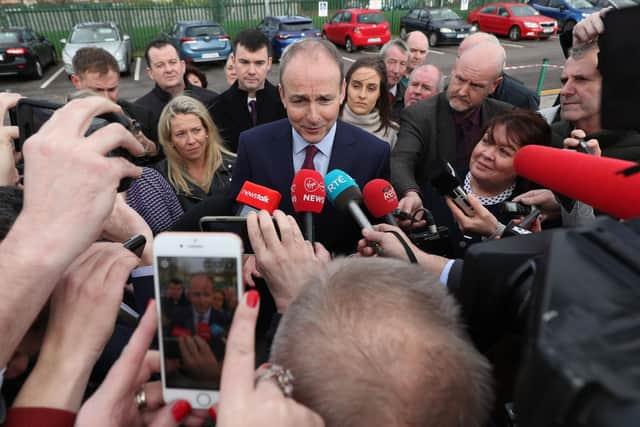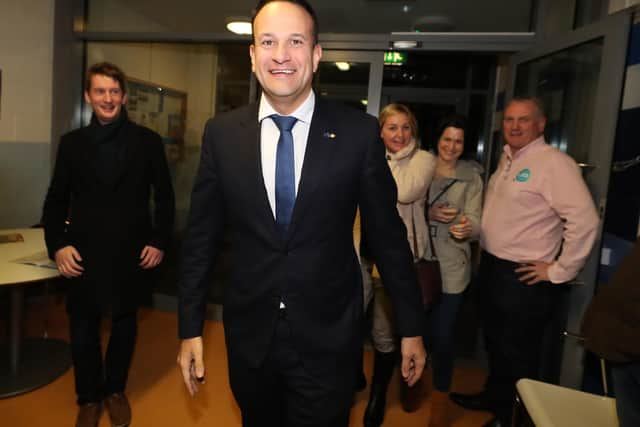Sinn Fein gets the most votes in the Republic of Ireland general election, 2.4% clear of any other party


The republican party was at 10.30pm confirmed to have got the largest number of first preference votes in the contest.
With the first counts completed in all 39 out of 39 constituencies, Sinn Fein out-polled both of the two main political parties, Fine Gael and Fianna Fail.
Advertisement
Hide AdAdvertisement
Hide AdSinn Fein collected 24.5% of all ballots cast across the Republic of Ireland on Saturday, a comfortable 2.3% clear of Fianna Fail, led by Micheal Martin, which was second, with 22.2% of the vote.


Fine Gael, the party of the outgoing Taoiseach Leo Varadkar, trailed in third, winning a mere 20.9% of first preferences.
Sinn Fein however will fall well short of the 80 seats required to form a government in the Dail, because it only fielded 42 candidates.
The party might also do less well in vote transfers than it did in first preferences.
Advertisement
Hide AdAdvertisement
Hide AdBoth Fianna Fail and Fine Gael could end up with more seats than Sinn Fein when counting is completed on Monday.


It will be hard, however, for any party to form the majority needed to form a government.
Mr Martin has failed to rule out entering government with Sinn Fein. While he stopped short of repeating his pre-election pledge never to do business with Sinn Fein, Taoiseach and Mr Varadkar did restate his determination not to partner up with Mary Lou McDonald’s party.
Mrs McDonald said she was willing to talk to all political leaders but expressed a desire to lead a coalition made up of left-leaning parties, without any input from Fianna Fail or Fine Gael, which are both centre-right in outlook.
Advertisement
Hide AdAdvertisement
Hide AdWhile it remains unclear whether it will ultimately be part of any future coalition, Sinn Fein’s performance has sent shockwaves through Ireland’s political establishment.
Sinn Fein is unlikely to emerge with the most seats, mainly because it ran significantly fewer candidates than its two main rivals – 42 compared to Fianna Fail’s 84 and Fine Gael’s 82.
Arriving at his count centre in Cork, Mr Martin would not rule out working with Sinn Fein or Fine Gael, having definitively refused to countenance either as coalition partners during the campaign.
The Fianna Fail leader, who said his party looked like being on course to win the most seats, was repeatedly pressed to restate his opposition to a potential Sinn Fein partnership.
Advertisement
Hide AdAdvertisement
Hide AdWhile insisting there were “significant incompatibility” issues in terms of policy, he did not dismiss the suggestion outright.
“Our policies, our positions and principles haven’t changed overnight or in 24 hours,” he said.
In a result symbolic of the Sinn Fein surge, the first seat declared in the election was the party’s Donnchadh O Laoghaire, who topped the poll in Cork South Central ahead of Mr Martin.
Mr Varadkar was also outpolled by a Sinn Fein candidate in Dublin West.
Advertisement
Hide AdAdvertisement
Hide AdMr Martin said: “We will obviously listen. The people have spoken and there is no greater democrat than I, but that said we will not pre-empt the outcome itself because it’s very clear to us that the destination of the final seats in many constituencies cannot be called now.”
Mr Varadkar said he would not be speaking to Mrs McDonald with a view to forming a coalition, insisting Fine Gael was “not compatible with Sinn Fein”.
“We are willing to talk to other parties about how we could form a government and give this country a government that can spend the next five years dealing with the problems that we have had to tackle for the past few years,” he said.
If parties do ultimately stick to their pre-election pledges then it would be extremely difficult for any of the three to lead a majority government.
Advertisement
Hide AdAdvertisement
Hide AdSmaller parties such as the Greens, Labour, the Social Democrats and Solidarity/People Before Profit – and a sizeable number of independent TDs – may all be courted as the main parties seek junior coalition partners.
Arriving at the RDS count centre in Dublin, Mrs McDonald branded talk of excluding her party as “undemocratic”.
She said she had been in touch with the Greens, Social Democrats and People Before Profit to discuss the prospect of them joining her party in government.
The uncertainty created by the exit poll has even thrown up the possibility of another general election being necessary.
Advertisement
Hide AdAdvertisement
Hide AdThere are 160 seats in the Dail parliament. The speaker is automatically re-elected, leaving 159 seats up for grabs and 80 the magic number for a majority.
Mr Varadkar’s last government – a minority Fine Gael-led administration that included several independent TDs – was sustained in power through a historic confidence and supply arrangement with Fianna Fail.
Counting, which is taking place across the state’s 39 constituencies, is expected to last at least two days.
• Morning View: Dublin insisted SF be in power here, and so boosted them there